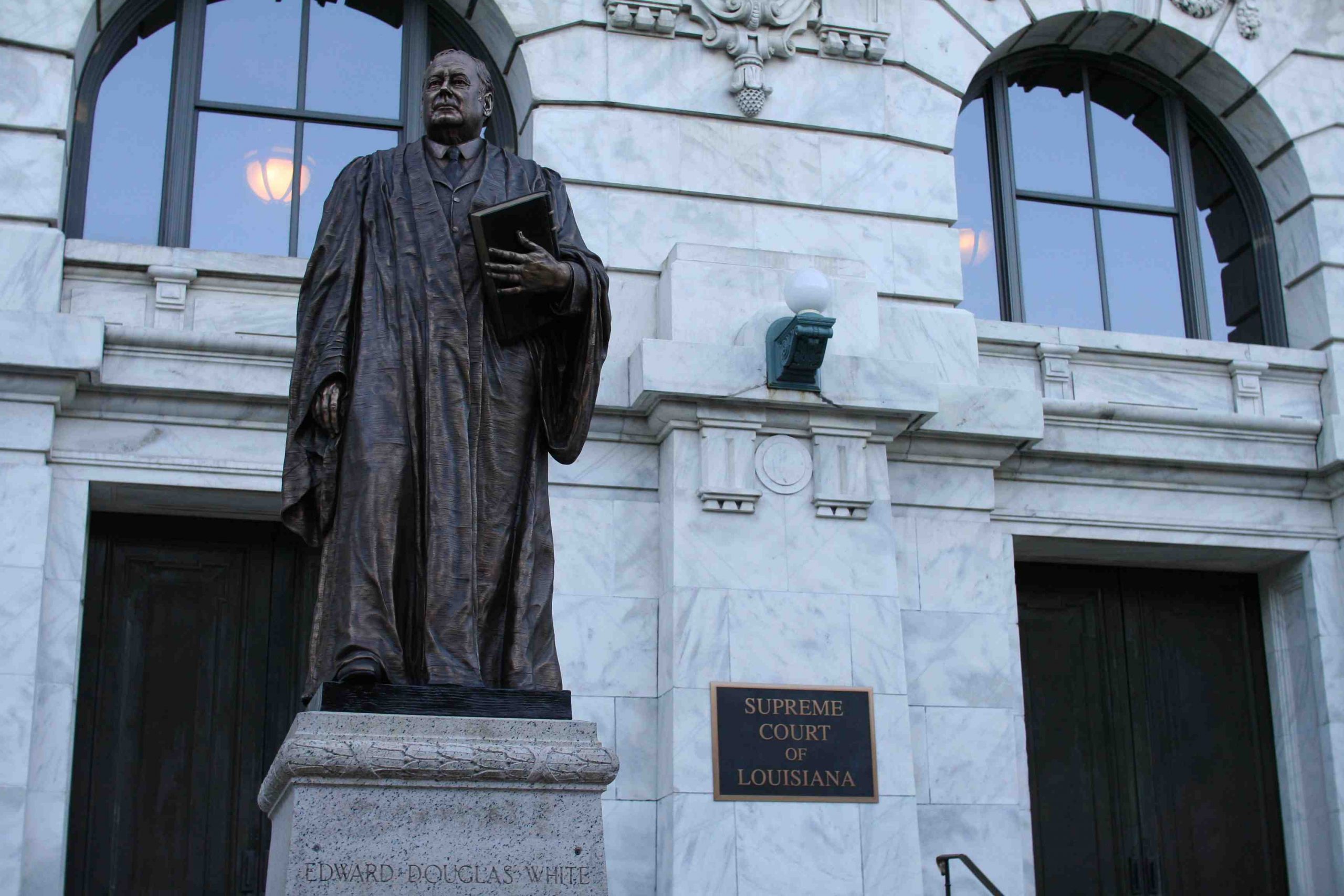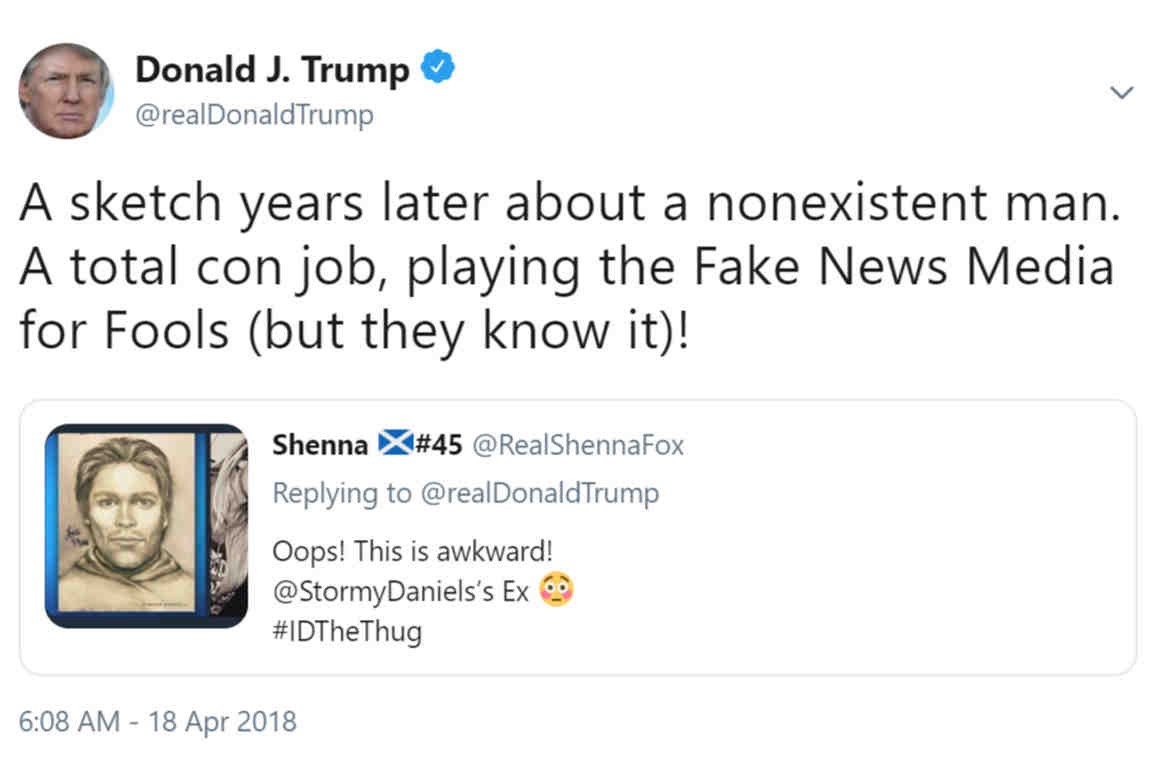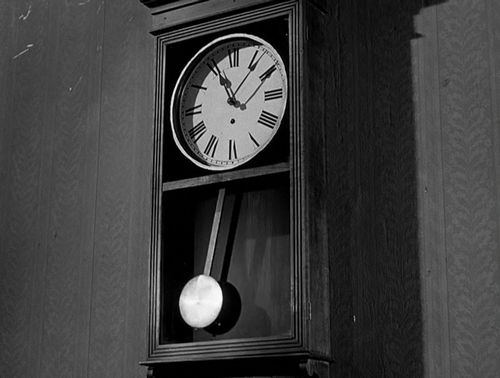 The long and winding case of Doe v. McKesson, remanded from the Supreme Court with instruction to certify a threshold state-law question to the Louisiana Supreme Court, added one more state-law issue after remand. Doe v. McKesson, No. 17-30864 (June 25, 2021).
The long and winding case of Doe v. McKesson, remanded from the Supreme Court with instruction to certify a threshold state-law question to the Louisiana Supreme Court, added one more state-law issue after remand. Doe v. McKesson, No. 17-30864 (June 25, 2021).
Category Archives: Erie
The appellant in Lillie v. Office of Financial Institutions argued that an adverse summary judgment was based on an unreliable case. The Fifth Circuit disagreed: “The court relied on Friedman only in reasoning that a showing of ‘but-for causation’—namely that SEI might have been able to prevent STC’s violations—is not enough to establish control. Such a rationale … is distinct from Friedman’s independent holding that the plaintiffs there had not alleged culpability. One may cite a case without endorsing everything for which it stands. The district court understood the law.” No. 19-30705 (May 14, 2021).
 28 USC § 1631 says: “Whenever a civil action is filed in a court as defined in section 610 of this title . . . and that court finds that there is a want of jurisdiction, the court shall, if it is in the interest of justice, transfer such action or appeal to any other such court . . . in which the action or appeal could have been brought at the time it was filed . . ., and the action or appeal shall proceed as if it had been filed in . . . the court to which it is transferred on the date upon which it was actually filed in . . . the court from which it is transferred.” In Franco v. Mabe Trucking Co., the Fifth Circuit concluded that “want of jurisdiction” included both personal and subject-matter jurisdiction, observing: “[I]t appears no circuit split currently exists on this issue, and while we cannot predict how those circuits who have left the question open will ultimately resolve the matter, we decline to now create a split by adopting an overly restrictive reading of § 1631. Because no amount of legislative history can defeat unambiguous statutory text, we join the weight of circuit authority and conclude that the use of the term ‘jurisdiction’ in § 1631 encompasses both subject-matter and personal jurisdiction.” No. 19-30316 (March 18, 2021) (footnote and citation omitted). The Court also found no Erie problem in section 1631’s definition of the relevant filing date for limitations purposes.
28 USC § 1631 says: “Whenever a civil action is filed in a court as defined in section 610 of this title . . . and that court finds that there is a want of jurisdiction, the court shall, if it is in the interest of justice, transfer such action or appeal to any other such court . . . in which the action or appeal could have been brought at the time it was filed . . ., and the action or appeal shall proceed as if it had been filed in . . . the court to which it is transferred on the date upon which it was actually filed in . . . the court from which it is transferred.” In Franco v. Mabe Trucking Co., the Fifth Circuit concluded that “want of jurisdiction” included both personal and subject-matter jurisdiction, observing: “[I]t appears no circuit split currently exists on this issue, and while we cannot predict how those circuits who have left the question open will ultimately resolve the matter, we decline to now create a split by adopting an overly restrictive reading of § 1631. Because no amount of legislative history can defeat unambiguous statutory text, we join the weight of circuit authority and conclude that the use of the term ‘jurisdiction’ in § 1631 encompasses both subject-matter and personal jurisdiction.” No. 19-30316 (March 18, 2021) (footnote and citation omitted). The Court also found no Erie problem in section 1631’s definition of the relevant filing date for limitations purposes.
Equity takes many forms; in Louisiana landlord-tenant law, it manifests as the doctrine of “judicial control.” In Richards Clearview LLC v. Bed Bath & Beyond, the Fifth Circuit observed: “[E]ven assuming arguendo that BB&B defaulted on the lease, the ‘unusual circumstances’ of this case—pandemic-related office closures causing delays in the receipt of notice coupled with prompt efforts to rectify the asserted underpayments— warranted the district court’s exercise of judicial control.” No. 20-30614 (March 8, 2021) (unpublished).
WickFire won a tortious-interference judgment against TriMax. It claimed that TriMax “committed ‘click fraud’ by repeatedly clicking on WickFire’s advertisements without any intention of making purchases,” which has the effect of driving up WickFire’s costs without any corresponding increase in revenues. The Fifth Circuit reversed, noting:
- Tortious interference with contract. “WickFire produced evidence that a third party had a deleterious financial effect on its bottom line. But as was the case in El Paso Healthcare System, the record here fails to indicate that WickFire’s damages occurred because a co-contracting party breached its agreement with WickFire.”
- Tortious interference with prospective business relations. “WickFire’s damages theory for this claim was grounded in the assertions that TriMax’s tortious conduct delayed the development of TheCoupon.co website by six months and that WickFire lost $334,000 in profits because of that delay. When WickFire’s damages expert was asked how he calculated that dollar figure, the expert said that he had ‘quantified those damages by calculating the amount of profits that [WickFire] lost because of the six-month delay.’ He did not testify as to how he performed that calculation, nor did he point to any data concerning the business generated by TheCoupon.co. This evidence is threadbare and conclusory.”
Wickfire LLC v. Woodruff, No. 17-50340 (Feb. 26, 2021).
 On rehearing, the Fifth Circuit returned to the case of Echeverry v. Jazz Casino to make an Erie guess about Louisiana negligent-hiring law–specifically, whether it requires actual knowledge or only constructive knowledge. Finding its own precedent, and no on-point Louisiana Supreme Court opinion, the Court then reviewed intermediate-court opinions and
On rehearing, the Fifth Circuit returned to the case of Echeverry v. Jazz Casino to make an Erie guess about Louisiana negligent-hiring law–specifically, whether it requires actual knowledge or only constructive knowledge. Finding its own precedent, and no on-point Louisiana Supreme Court opinion, the Court then reviewed intermediate-court opinions and  “general Louisiana principles of negligence and negligent hiring outside of the context of independent contractors” to conclude that constructive knowledge was sufficient. It declined to certify the issue, reminding that “the availability of certification is such an important resource to this court that we will not risk its continued availability by going to that well too often.” No. 20-30038 (Feb. 17, 2021) (on rehearing).
“general Louisiana principles of negligence and negligent hiring outside of the context of independent contractors” to conclude that constructive knowledge was sufficient. It declined to certify the issue, reminding that “the availability of certification is such an important resource to this court that we will not risk its continued availability by going to that well too often.” No. 20-30038 (Feb. 17, 2021) (on rehearing).
 Section 9.343 of the Texas UCC contains a nonuniform provision, “which grants a first
Section 9.343 of the Texas UCC contains a nonuniform provision, “which grants a first
priority purchase money security interest in oil and gas produced in Texas as well as proceeds in the hands of any ‘first purchaser.’ A ‘first purchaser,’ is in pertinent part, ‘the first person that purchases oil or gas production from an operator or interest owner after the production is severed.’ The statute’s purpose is to ‘provide[] a security interest in favor of interest owners, as secured parties, to secure the obligations of the first purchaser of . . . production, as debtor, to pay the purchase price.’ It effectuates a ‘security interest’ that is ‘perfected automatically without the filing of a financing statement.'” (citations omitted). But Delaware lien-priority law does not recognize  nonuniform UCC provisions, and in Deutsche Bank Trust Co. Americas v. U.S. Energy Devel. Corp., the Fifth Circuit affirmed the bankruptcy court’s conclusion that Delaware law applied to the case before it. The Court observed: “The bankruptcy court adroitly untangled a thorny conflicts of law issue, the result of which, unfortunately, undermines the efficacy of a non-standard UCC provision intended to protect Texas oil and gas producers. . As a result, producers must beware ‘the amazing disappearing security interest’ and continue to file financing statements. The Texas legislature should take note.” No. 19-50646 (Feb. 3, 2021) (citations and footnote omitted).
nonuniform UCC provisions, and in Deutsche Bank Trust Co. Americas v. U.S. Energy Devel. Corp., the Fifth Circuit affirmed the bankruptcy court’s conclusion that Delaware law applied to the case before it. The Court observed: “The bankruptcy court adroitly untangled a thorny conflicts of law issue, the result of which, unfortunately, undermines the efficacy of a non-standard UCC provision intended to protect Texas oil and gas producers. . As a result, producers must beware ‘the amazing disappearing security interest’ and continue to file financing statements. The Texas legislature should take note.” No. 19-50646 (Feb. 3, 2021) (citations and footnote omitted).
Belliveau v. Barco, Inc., discussed yesterday as to its holding about veil-piercing, also found that the plaintiff had not established a fiduciary relationship with the defendants under Texas law. The Court examined:
- The general principle that “one party’s subjective belief” is insufficient to establish an attorney-client relationship;
- The inadequacy of “vague and conclusory” statements about the parties’ dealings to satisfy that standard (especially if later deposition testimony undermines those statements); and
- The long-standing principle that to establish an informal relationship of “trust and confidence,” that relationship must have existed before the “agreement made
the basis of the suit.”
No. 19-5017 (Jan. 28, 2021). The dissenting judge agreed with the majority on its analysis of this claim.
 In a dispute about various licensing agreements, the Fifth Circuit found that Texas law’s requirements for piercing the corporate veil had not been satisfied:
In a dispute about various licensing agreements, the Fifth Circuit found that Texas law’s requirements for piercing the corporate veil had not been satisfied:
“The evidence, when viewed as a whole, does not raise a fact issue regarding Barco’s dishonest purpose or intent to deceive Belliveau in entering into the Barco Sublicense. Piercing the corporate veil is not a cumulative remedy for creditors of corporate or other legal entities in Texas; that theory does not make owners of such entities codefendants for every breach of contract case. It is a remedy to be used when the actions of the entity’s owner amounting to ‘actual fraud’ have rendered the entity unable to pay its debts. The district court properly granted summary judgment on Belliveau’s claim to pierce the corporate veil.”
Specifically, the court reviewed (and rejected) arguments about the consideration exchanged in the licensing agreement, issues about disclosure, and a “badges of fraud” analysis under Texas’s fraudulent-transfer statute. Belliveau v. Barco, Inc., No. 19-50717 (Jan. 28, 2021). A dissent identified issues for trial on these matters.
 An unusual procedural path, winding through a bankruptcy proceeding, led the Fifth Circuit to review a state-court summary judgment. On the issue of the state court’s evidentiary rulings, the Court applied a federal-court approach to a standard form of Texas practice, reasoning: “The grant of these objections improperly excluded important evidence from consideration. To start, the state trial court offered no explanation as to why it granted the objections. It simply checked boxes on a form saying that the objections were sustained. Since a trial court can abuse its discretion by failing to explain the reasons for excluding evidence, the lack of a reasoned explanation weighs in favor of overturning the objections. Courts also typically consider evidence unless the objecting party can show that it could not be reduced to an admissible form at trial.” Cohen v. Gilmore, No. 19-20152 (Dec. 15, 2020) (citations omitted).
An unusual procedural path, winding through a bankruptcy proceeding, led the Fifth Circuit to review a state-court summary judgment. On the issue of the state court’s evidentiary rulings, the Court applied a federal-court approach to a standard form of Texas practice, reasoning: “The grant of these objections improperly excluded important evidence from consideration. To start, the state trial court offered no explanation as to why it granted the objections. It simply checked boxes on a form saying that the objections were sustained. Since a trial court can abuse its discretion by failing to explain the reasons for excluding evidence, the lack of a reasoned explanation weighs in favor of overturning the objections. Courts also typically consider evidence unless the objecting party can show that it could not be reduced to an admissible form at trial.” Cohen v. Gilmore, No. 19-20152 (Dec. 15, 2020) (citations omitted).
“When Amazon allows third parties to sell products on its website, is Amazon ‘placing’ products into the stream of commerce or merely ‘facilitating’ the stream? If the former, then Amazon is a ‘seller’ under Texas products-liability law and potentially liable for injuries caused by unsafe products sold on its website. But if Amazon only facilitates the stream when it hosts third-party vendors on its platform, then it is not a seller, meaning injured consumers cannot sue for alleged product defects.” The Fifth Circuit certified this important issue to the Texas Supreme Court in McMillian v. Amazon, No. 20-20108 (Dec. 18, 2020).
Practice tip: In the Court’s review of whether the issue warranted certification, it noted that both parties had agreed that there was “substantial ground for difference of opinion” in order to proceed with an interlocutory appeal under 28 U.S.C. § 1292(b).
Doe, a police officer, sued under Louisiana state law for injuries that he suffered when trying to clear a highway of protesters, who had been organized by McKesson. The district court dismissed the case on First Amendment grounds; a Fifth Circuit panel majority “held that a jury could plausibly find that Mckesson breached his ‘duty not to negligently precipitate the crime of a third party’ because ‘a violent confrontation with a police officer was a foreseeable effect of negligently directing a protest’ onto the highway, and the en b anc court divided -8 on whether to further review the case.
anc court divided -8 on whether to further review the case.
The Supreme Court held that the issue should be certified to the Louisiana Supreme Court, noting that “the dispute presents novel issues of state law peculiarly calling for the exercise of judgment by the state courts,” and that “certification would ensure that any conflict in this case between state law and the First Amendment is not purely hypothetical. The novelty of the claim at issue here only underscores that ‘[w]arnings against premature adjudication of constitutional questions bear heightened attention when a federal court is asked to invalidate a State’s law.'” McKesson v. Doe, No.19–1108 (U.S. Nov. 2, 2020) (citation omitted).
All journeys must end, and at long last the journey of the transferee’s good-faith defense has ended in Janvey v. GMAG LLC: “This case requires us to determine whether the Texas Uniform Fraudulent Transfer Act’s … good faith affirmative defense allows Defendants-Appellees to retain fraudulent transfers received while on inquiry notice of a Ponzi scheme. We initially held it does not. We then vacated that decision so that the Supreme Court of Texas could clarify whether good faith requires a transferee on inquiry notice to conduct an investigation into the fraud, or, alternatively, show that such an investigation would have been futile. Having received an answer to our question, we once again hold that the Defendants-Appellees’ good faith defense must fail.” No. 17-11526 (Oct. 8, 2020).
 While Adams v. Alcolac, Inc. presents an exotic dispute –civil liability for the use of mustard gas by Saddam Hussein’s regime–it turns on a fundamental issue of foreseeability under Texas tort (conspiracy) law: “The plaintiffs argue that it was foreseeable that the exported TDG [chemical] would be turned into mustard gas by some ‘nefarious character’ and that it would then be ‘used for terrorist activity.’ Perhaps so, but that misses the point. The question is not whether the plaintiffs’ battery was a foreseeable result of the alleged conspiracy but whether the battery was ‘done in pursuance of the common purpose of the conspiracy[.]’ Because there is no evidence of a common purpose beyond the initial sale and exportation of the TDG, any eventual use of mustard gas on the plaintiffs, even if foreseeable, was not in furtherance of the alleged conspiracy. The plaintiffs’ conspiracy claim thus fails for lack of an underlying tort.” No. 19-40899 (revised, Sept. 25, 2020) (citations and footnote omitted, emphasis added).
While Adams v. Alcolac, Inc. presents an exotic dispute –civil liability for the use of mustard gas by Saddam Hussein’s regime–it turns on a fundamental issue of foreseeability under Texas tort (conspiracy) law: “The plaintiffs argue that it was foreseeable that the exported TDG [chemical] would be turned into mustard gas by some ‘nefarious character’ and that it would then be ‘used for terrorist activity.’ Perhaps so, but that misses the point. The question is not whether the plaintiffs’ battery was a foreseeable result of the alleged conspiracy but whether the battery was ‘done in pursuance of the common purpose of the conspiracy[.]’ Because there is no evidence of a common purpose beyond the initial sale and exportation of the TDG, any eventual use of mustard gas on the plaintiffs, even if foreseeable, was not in furtherance of the alleged conspiracy. The plaintiffs’ conspiracy claim thus fails for lack of an underlying tort.” No. 19-40899 (revised, Sept. 25, 2020) (citations and footnote omitted, emphasis added).
 In Franklin v. Regions Bank. “Plaintiffs contracted with Regions Bank for it to manage, as their agent, their mineral interests in a large tract of land.” Under Louisiana law, the parties had “a principal-mandatary relationship, which is equivalent to a common-law principal-agent relationship.” In an Erie analysis, the Fifth Circuit noted that after the Louisiana Supreme Court limited a plaintiff’s ability to choose between a contract or tort remedy (with a large potential effect on limitations) in some mandatary relationships, the legislature then “shortened the limitations periods for claims against engineers, surveyors, professional interior designers, architects, real-estate developers, and home inspectors. Instead of shortening the limitations period for all mandataries, the legislature chose to single-out certain professions for special treatment.” After then coupling that observation with general Louisiana legal principles about strict construction of limitation statutes, the Court held that the plaintiffs wereable to choose a tort remedy with a 10-year limitations period. No. 19-30684 (Sept. 18, 2020).
In Franklin v. Regions Bank. “Plaintiffs contracted with Regions Bank for it to manage, as their agent, their mineral interests in a large tract of land.” Under Louisiana law, the parties had “a principal-mandatary relationship, which is equivalent to a common-law principal-agent relationship.” In an Erie analysis, the Fifth Circuit noted that after the Louisiana Supreme Court limited a plaintiff’s ability to choose between a contract or tort remedy (with a large potential effect on limitations) in some mandatary relationships, the legislature then “shortened the limitations periods for claims against engineers, surveyors, professional interior designers, architects, real-estate developers, and home inspectors. Instead of shortening the limitations period for all mandataries, the legislature chose to single-out certain professions for special treatment.” After then coupling that observation with general Louisiana legal principles about strict construction of limitation statutes, the Court held that the plaintiffs wereable to choose a tort remedy with a 10-year limitations period. No. 19-30684 (Sept. 18, 2020).
Two causes of action under Texas law, frequently asserted but rarely tried, were rejected by the Fifth Circuit in BBX Operating v. Bank of America, No. 19-11050 (Aug. 11, 2020, unpublished):
- Conversion. “They are conclusory allegations, which merely ‘parrot the words needed to create a claim’ without providing any factual basis for how BBX maintained an ownership interest in the funds. Perhaps recognizing this deficiency, the amended complaint characterized the funds at issue as ‘trust funds,’ and claimed that Murphy ‘held the funds . . . in trust for BBX’—the rightful owner. Yet that label is again unsupported by any factual allegations. The complaint said nothing of when or how this alleged trust was formed. And there are no allegations that Murphy entered into an agreement to create a trust.” (emphasis added)
- Money had and received. “BBX has not alleged facts demonstrating that the funds Bank of America swept from Murphy’s account belong to BBX. Nothing in the sales contract or any other agreement between BBX and Murphy demonstrates that funds Murphy collected and placed in a Bank of America account in Murphy’s name belong to BBX. Furthermore, BBX is no more the owner of those funds than the working interest owners and royalty owners that were supposed to receive payment after Murphy remitted a portion of the funds to
BBX. At most, the amended complaint demonstrates that BBX has an unsecured breach of contract claim against Murphy for failing to satisfy whatever amounts Murphy owed BBX under the sales contract that governed their relationship. It does not demonstrate that these particular funds belong to BBX. Thus, the district court properly dismissed BBX’s money had and received claim.” (emphasis added)
 An alleged tortfeasor, earlier named as a party in a case, settled with the plaintiff. The plaintiff sought to submit a conspiracy count related to that party, and the Fifth Circuit agreed: “The alleged co-conspirator need not actually face liability. … [A]settlement in general does not prevent submitting to the jury questions about that party’s conduct (only pursuing an actual judgment against the settling party). Therefore, we conclude that Phadia’s settlement had no bearing on the Plaintiffs’ ability to prove a civil conspiracy case against the Defendants based on an underlying tort committed by Phadia.” United Biologics v. Allergy & Asthma Network, No. 19-50257 (June 24, 2020) (unpublished).
An alleged tortfeasor, earlier named as a party in a case, settled with the plaintiff. The plaintiff sought to submit a conspiracy count related to that party, and the Fifth Circuit agreed: “The alleged co-conspirator need not actually face liability. … [A]settlement in general does not prevent submitting to the jury questions about that party’s conduct (only pursuing an actual judgment against the settling party). Therefore, we conclude that Phadia’s settlement had no bearing on the Plaintiffs’ ability to prove a civil conspiracy case against the Defendants based on an underlying tort committed by Phadia.” United Biologics v. Allergy & Asthma Network, No. 19-50257 (June 24, 2020) (unpublished).
 In Williams v. MMO Behavioral Health Systems, the Fifth Circuit affirmed a $244,000 judgment for defamation, entered after a jury trial. Good record keeping often benefits defendants in employment-related litigation, but in this case it helped the plaintiff on a key issue:
In Williams v. MMO Behavioral Health Systems, the Fifth Circuit affirmed a $244,000 judgment for defamation, entered after a jury trial. Good record keeping often benefits defendants in employment-related litigation, but in this case it helped the plaintiff on a key issue:
Before MMO had published the statement to the [Louisiana Workforce Commission], Williams had informed MMO that she did not falsify her timecard. This should have led MMO to examine Williams’s timecard. If MMO had done so, it would have discovered that even though Williams regularly clocked in every day, the timecard facially showed that someone else clocked in Williams on July 5th. This fact indicates that MMO should have known that Williams was not the one falsifying her timecard. The times for which Williams was clocked in on July 5th were also not her normal working hours, further suggesting that Williams was not the one to clock in on July 5th. Moreover, Williams did not fill out a missed-clock-punch form, which would have been necessary to allow someone else to clock her in or out, suggesting that Williams was not even involved with this July 5th clocking in and out.
No. 19-30757 (July 9, 2020) (unpublished).
 Digidrill sued for unjust enrichment, “alleging [that] Petrolink hacked into its software at various oil drilling sites in order to ‘scrape’ valuable drilling data in real time.” The Fifth Circuit held: “Digirill’s claim is not preempted by copyright because—like the claim in GlobeRanger—it requires establishing that Petrolink engaged in wrongful conduct beyond mere reproduction: namely, the taking of an undue advantage. Under Texas law an unjust enrichment claim requires showing that one party ‘has obtained a benefit from another by fraud, duress, or the taking of an undue advantage.’ Digidrill … contends Petrolink obtained a benefit by taking undue advantage when it surreptitiously installed [certain software]. This is the claim Digidrill put to the jury. Like the alleged misappropriation-of-trade-secrets claim in GlobeRanger, which required establishing improper means or breach of a confidential relationship, Digidrill’s alleged unjust enrichment claim requires establishing wrongful conduct—i.e., inducing the MWD
Digidrill sued for unjust enrichment, “alleging [that] Petrolink hacked into its software at various oil drilling sites in order to ‘scrape’ valuable drilling data in real time.” The Fifth Circuit held: “Digirill’s claim is not preempted by copyright because—like the claim in GlobeRanger—it requires establishing that Petrolink engaged in wrongful conduct beyond mere reproduction: namely, the taking of an undue advantage. Under Texas law an unjust enrichment claim requires showing that one party ‘has obtained a benefit from another by fraud, duress, or the taking of an undue advantage.’ Digidrill … contends Petrolink obtained a benefit by taking undue advantage when it surreptitiously installed [certain software]. This is the claim Digidrill put to the jury. Like the alleged misappropriation-of-trade-secrets claim in GlobeRanger, which required establishing improper means or breach of a confidential relationship, Digidrill’s alleged unjust enrichment claim requires establishing wrongful conduct—i.e., inducing the MWD
companies to violate the express terms of their DataLogger licenses—that goes
beyond mere copying.” Digital Drilling Data Sysems LLC v. Petrolink Servcs., Inc., No. 19-20116 (July 2, 2020) (footnote omitted, emphasis added). The Court noted that a different type of unjust-enrichment claim could potentially lead to a different result.
Phoneternet complained that an inaccurate report available on Lexis-Nexis caused the loss of a business opportunity (oddly enough, with the car company Lexus). The Fifth Circuit affirmed, holding (among other matters) as to their negligent-misrepresentation and promissory-estoppel claims:
“If Phoneternet believed the errors had already been corrected, there would have been no reason for Phoneternet to repeatedly call LexisNexis. In that case, Phoneternet would be asking LexisNexis to correct already accurate information. Moreover, to the extent Phoneternet did rely on LexisNexis’s alleged statement that all fifteen errors in the report had been “modified . . . as requested,” such reliance cannot be considered reasonable and justified. Given the alleged importance of this report—the only remaining obstacle between Phoneternet and a lucrative multimillion-dollar contract with Toyota—Phoneternet should have at least confirmed that the errors had been corrected before blindly relying on LexisNexis’s representation.”
Phoneternet LLC v. Lexis-Nexis, No. 19-11194 (June 3, 2020) (unpublished) (emphasis added).
I n Golden Spread Electric Co-op v. Emerson Process Management, the Fifth Circuit affirmed the dismissal of business-tort claims under Texas’s economic loss rule.
n Golden Spread Electric Co-op v. Emerson Process Management, the Fifth Circuit affirmed the dismissal of business-tort claims under Texas’s economic loss rule.
Golden Spread, a public utility, contracted with Emerson to provide “a new, customized control system” for a steam turbine generator. During testing of the new system, the software installed by Emerson issued a mistaken command that caused the turbine to overheat and become damaged.
The Fifth Circuit reviewed Golden Spread’s claims in light of two policy considerations identified by Texas cases in the area. First, “[p]urely economic harms proliferate widely and are not self-limiting in the way that physical damage is ….” Second, “the risk of economic harms are better suited to allocation by contract” because the parties “usually have a full opportunity” to negotiate such risks before finalizing a contract.
The Court’s reasoning may prove relevant to future lawsuits involving business issues arising from the current COVID-19 crisis.
 This is a cross-post from 600Hemphill, which follows the Texas Supreme Court:
This is a cross-post from 600Hemphill, which follows the Texas Supreme Court:
Henry McCall lived in a cabin on Homer Hillis’s property, occasionally helping Hillis with maintenance at the McCall’s bed-and-breakfast. While working on Hillis’s sink, a brown recluse spider bit McCall. The Texas Supreme Court found that  the ferae naturae doctrine barred McCall’s lawsuit against Hillis: “[H]e owed no duty to the invitee because he was unaware of the presence of brown recluse spiders on his property and he neither attracted the offending spider to his property nor reduced it to his possession. Further, [McCall] had actual knowledge of the presence of spiders on the property.” Hillis v. McCall, No. 18-1065 (Tex. March 13, 2020). In addition to its impact on brown-recluse litigation, the reasoning of this opinion about liability for small, dangerous creatures well be relevant in any future litigation about coronavirus exposure.
the ferae naturae doctrine barred McCall’s lawsuit against Hillis: “[H]e owed no duty to the invitee because he was unaware of the presence of brown recluse spiders on his property and he neither attracted the offending spider to his property nor reduced it to his possession. Further, [McCall] had actual knowledge of the presence of spiders on the property.” Hillis v. McCall, No. 18-1065 (Tex. March 13, 2020). In addition to its impact on brown-recluse litigation, the reasoning of this opinion about liability for small, dangerous creatures well be relevant in any future litigation about coronavirus exposure.
 Resolution of the tortious-interference claim in Whitney Bank v. SMI Companies Global, Inc. turned on whether the defendant’s profit motive could establish “actual malice” as required by Louisiana law. To the panel majority:
Resolution of the tortious-interference claim in Whitney Bank v. SMI Companies Global, Inc. turned on whether the defendant’s profit motive could establish “actual malice” as required by Louisiana law. To the panel majority:
There is no evidence that Whitney was driven by anything other than profit in its collection efforts. Moreover, the express terms of the contract allowed Whitney to recover from SMI’s customers because both loans were secured by SMI’s accounts receivable. While it may have been more prudent and logical for Whitney to involve SMI in its collection efforts, those efforts, however brusque, served to protect the bank’s legitimate interests—collecting on the defaulted loans.
(citations omitted, emphasis added). The dissent, however:
Often this requirement [of “actual malice”] is insurmountable in the business context because of the “appropriate” motivation of profits. But I disagree with the notion that someone in a corporation who is seeking to collect money from another can never have actual malice or ill will towards that other. Corporations are run by humans, after all. . . . The magistrate judge’s decision rested in part on its determination that Whitney’s employees lacked credibility, and we do not second-guess credibility determinations.
No. 18-31189 (Feb. 3, 2020) (emphais added). (Louisiana’s actual-malice requirement for this tort is uniquely demanding, so this discussion may be less relevant in other jurisdictions.)
 Gonzales cited two Texas Supreme Court cases, decided after a summary judgment against her, holding that an insurer’s payment of an appraisal award does not preclude a Texas Prompt Payment of Claims Act (“TPPCA”) claim. The Fifth Circuit found that she failed to preserve this argument in the district court. The Court noted that “a change in law . . . does not permit a party to raise an entirely new argument that could have been articulated below”–a rule that applies when a party “could have made the same ‘general argument’ to the district court, but had not done so.” As for the state of the law at the time of the summary-judgment briefing, the Court observed:
Gonzales cited two Texas Supreme Court cases, decided after a summary judgment against her, holding that an insurer’s payment of an appraisal award does not preclude a Texas Prompt Payment of Claims Act (“TPPCA”) claim. The Fifth Circuit found that she failed to preserve this argument in the district court. The Court noted that “a change in law . . . does not permit a party to raise an entirely new argument that could have been articulated below”–a rule that applies when a party “could have made the same ‘general argument’ to the district court, but had not done so.” As for the state of the law at the time of the summary-judgment briefing, the Court observed:
We recognize that several courts, including our own, had previously concluded a TPPCA claim was extinguished as a matter of law after the payment of an appraisal award. But the Supreme Court of Texas granted review in [the two relevant cases] on January 18, 2019, seven days after Allstate moved for summary judgment and thirteen days before Gonzales filed her response to the motion. This fact undermines her assertion here that she “could not have made a good faith argument in the trial court that payment of the appraisal award did not preclude her from recovering under the TPPCA as a matter of law.”
Gonzales v. Allstate Vehicle & Property Ins. Co., No. 19-40250 (Feb. 11, 2020) (emphasis added, footnote omitted).
 The issue in BNSF Railway v. Panhandle Northern Railroad was whether a “handling-carrier” relationship between two railroads was terminable at will. BNSF contended that it was not; Panhandle Northern, a short line operating between BNSF’s cross-country track and a large complex of chemical plants in the Texas Panhandle, argued that it was. The Fifth Circuit made a detailed “Erie guess” about the construction of the parties’ contract under the controlling Illinois law, and rendered judgment in favor of Panhandle Northern:
The issue in BNSF Railway v. Panhandle Northern Railroad was whether a “handling-carrier” relationship between two railroads was terminable at will. BNSF contended that it was not; Panhandle Northern, a short line operating between BNSF’s cross-country track and a large complex of chemical plants in the Texas Panhandle, argued that it was. The Fifth Circuit made a detailed “Erie guess” about the construction of the parties’ contract under the controlling Illinois law, and rendered judgment in favor of Panhandle Northern:
“[I]in making an Erie guess, we must determine, in our best judgment, how we believe the Illinois Supreme Court would resolve whether the handling-carrier relationship between PNR and BNSF is terminable at will. And, as reflected in the [key Illinois Supreme Court] decision, careful analysis of the text of the contract is paramount in making such a determination. Moreover, in the cases BNSF relies upon, the courts discussed the economics of the parties’ agreements only after first examining closely the text of the contracts at issue and determining that there were termination provisions sufficient to take the contracts of indefinite duration out of the general rule of at-will termination. Although the courts could have ended their decisions upon making those determinations, they then went on to discuss the economics of the parties’ agreements to further bolster their decisions that the contracts were not terminable at will.”
No. 18-11416 (Jan. 3, 2020). (LPCH represented the successful appellant in this case.)
 UCC section 9.404(a)(2) say that “the rights of an assignee are subject to . . . any other defense or claim of the account debtor against the assignor that accrues before the account debtor receives a notification of the assignment authenticated by the assignor or the assignee.” Applying this provision, the Fifth Circuit held: “Filing a financing statement does not provide actual notice. Without an inquiry duty, [debtor]’s failure to find the financing statement is not ‘actual notice.’ Because the facts presented do not support the conclusion of actual notice, the district court should have granted judgment in favor of [debtor].” Finserv Casualty Co. v. Symetra Life Ins. Co., No. 18-20245 (Oct. 29, 2019). The Court acknowledged that a sufficient factual record could establish actual notice, but found that this one did not do so: “Although [debtor] knew that the payments might be assigned, and even if it knew that such payments were routinely assigned in the structured-settlement industry, it could not have had more than a suspicion that the payments had in fact been assigned.”
UCC section 9.404(a)(2) say that “the rights of an assignee are subject to . . . any other defense or claim of the account debtor against the assignor that accrues before the account debtor receives a notification of the assignment authenticated by the assignor or the assignee.” Applying this provision, the Fifth Circuit held: “Filing a financing statement does not provide actual notice. Without an inquiry duty, [debtor]’s failure to find the financing statement is not ‘actual notice.’ Because the facts presented do not support the conclusion of actual notice, the district court should have granted judgment in favor of [debtor].” Finserv Casualty Co. v. Symetra Life Ins. Co., No. 18-20245 (Oct. 29, 2019). The Court acknowledged that a sufficient factual record could establish actual notice, but found that this one did not do so: “Although [debtor] knew that the payments might be assigned, and even if it knew that such payments were routinely assigned in the structured-settlement industry, it could not have had more than a suspicion that the payments had in fact been assigned.”
 If you are litigating a Texas contract-law case and feel the need to scratch an equitable itch – don’t: “The Supreme Court of Texas has observed that the interpretive role of judges ‘is to be neither generous nor parsimonious’ but unswervingly faithful to what the words actually say. Looser atextual readings may scratch an equitable itch, or at times seem more pragmatic. But the Texas High Court adheres to this centuries-old principle—’law, without equity, though hard and disagreeable, is much more desirable for the public good, than equity without law: which would make every judge a legislator, and introduce the most infinite confusion.’ Texas precedent is no-nonsense about giving words their most forthright, contextual meaning. Plain language forbids judicial ad-libbing. Here, the text is clear. And, at least in Texas, clear text = controlling text.” Weaver v. Metropolitan Life Ins. Co., No. 18-10517 (Sept. 20, 2019).
If you are litigating a Texas contract-law case and feel the need to scratch an equitable itch – don’t: “The Supreme Court of Texas has observed that the interpretive role of judges ‘is to be neither generous nor parsimonious’ but unswervingly faithful to what the words actually say. Looser atextual readings may scratch an equitable itch, or at times seem more pragmatic. But the Texas High Court adheres to this centuries-old principle—’law, without equity, though hard and disagreeable, is much more desirable for the public good, than equity without law: which would make every judge a legislator, and introduce the most infinite confusion.’ Texas precedent is no-nonsense about giving words their most forthright, contextual meaning. Plain language forbids judicial ad-libbing. Here, the text is clear. And, at least in Texas, clear text = controlling text.” Weaver v. Metropolitan Life Ins. Co., No. 18-10517 (Sept. 20, 2019).
 Nearly a century ago, the unfortunate Helen Palsgraf was injured in a Long Island Railroad station; the difficult tort-law issues arising from her injury continue to challenge the courts today. Martinez v. Walgreens Co. presented the question “whether, under Texas law, a pharmacy owes a duty of care to third parties injured on the road by a customer who was negligently given someone else’s prescription.” The Fifth Circuit answered “no,” considering, inter alia: (1) “[I]t was not sufficiently foreseeable that a pharmacy customer would take the medication in a bottle intended for someone else, notwithstanding that the label listed someone else’s name and a different medication,” and (2) “[T]he Texas legislature has shown itself to be both willing and able to undertake the public policy balancing inherent in extensive regulation of pharmacies’ treatment of prescription drugs.” No. 18-40636 (Aug. 6, 2019).
Nearly a century ago, the unfortunate Helen Palsgraf was injured in a Long Island Railroad station; the difficult tort-law issues arising from her injury continue to challenge the courts today. Martinez v. Walgreens Co. presented the question “whether, under Texas law, a pharmacy owes a duty of care to third parties injured on the road by a customer who was negligently given someone else’s prescription.” The Fifth Circuit answered “no,” considering, inter alia: (1) “[I]t was not sufficiently foreseeable that a pharmacy customer would take the medication in a bottle intended for someone else, notwithstanding that the label listed someone else’s name and a different medication,” and (2) “[T]he Texas legislature has shown itself to be both willing and able to undertake the public policy balancing inherent in extensive regulation of pharmacies’ treatment of prescription drugs.” No. 18-40636 (Aug. 6, 2019).
“Resolving an issue that has brewed for several years in this circuit, we conclude that the TCPA does not apply in diversity cases.” Klocke v. Watson, No. 17-11320 (revised Aug. 29, 2019) (emphasis added). “Because the TCPA imposes evidentiary weighing requirements not found in the Federal Rules, and operates largely without pre-decisional discovery, it conflicts with those rules.”
The viability of a tort claim against T-Mobile, arising from delays in obtaining medical treatment, turned on whether this recent statement by the Texas Supreme Court was “obiter dictum” or “judicial dictum”:
Proximate cause requires both cause in fact and foreseeability. For a condition of property to be a cause in fact, the condition must serve as a substantial factor in causing the injury and without which the injury would not have occurred. When a condition or use of property merely furnishes a circumstance that makes the injury possible, the condition or use is not a substantial factor in causing the injury. To be a substantial factor, the condition or use of the property must actually have caused the injury. Thus, the use of property that simply hinders or delays treatment does not actually cause the injury and does not constitute a proximate cause of an injury.
The Fifth Circuit concluded that the statement was judicial dictum entitled to deference in an Erie analysis, and rendered summary judgment for T-Mobile. Alex v. T-Mobile USA, Inc., No. 18-10555 (June 6, 2019, unpublished) (applying City of Dallas v. Sanchez, 494 S.W.3d 722 (Tex. 2016)). (My Pepperdine Law Review article with the University of Idaho’s Wendy Couture remains a strong summary of the underlying theory.)
 “The complaint alleges that during the April and October 2016 phone calls, the defendants negligently misrepresented to Mr. Dick that ‘reinstatement was not an option’ and that ‘there was nothing [the] Plaintiff could do to stop a foreclosure.’ The plaintiff’s claim that these misrepresentations prevented her from reinstating the loan merely repackages her claim for breach of contract based on the duty to cooperate. It is therefore barred by the economic loss rule.” Dick v. Colorado Housing Enterprises LLC, No. 18-10900 (July 5, 2019) (unpublished).
“The complaint alleges that during the April and October 2016 phone calls, the defendants negligently misrepresented to Mr. Dick that ‘reinstatement was not an option’ and that ‘there was nothing [the] Plaintiff could do to stop a foreclosure.’ The plaintiff’s claim that these misrepresentations prevented her from reinstating the loan merely repackages her claim for breach of contract based on the duty to cooperate. It is therefore barred by the economic loss rule.” Dick v. Colorado Housing Enterprises LLC, No. 18-10900 (July 5, 2019) (unpublished).
 Texas Capital Bank sued Zeidman for the alleged breach of a guaranty obligation. The Bank moved for summary judgment; in response, one of Zeidman’s arguments was that the Bank’s claim was barred by quasi-estoppel. He testified that “the Bank orally agreed to accept a $500,000 payment in satisfaction of the Guaranty, Zeidman wired that amount to the Bank, the Bank accepted the payment, and it later demanded additional payment under the Guaranty.” The Bank countered that this defense was barred by the statute of frauds, and the Fifth Circuit agreed that “oral modification of the Guaranty appears to be prohibited by the text of the Guaranty and the statute of frauds . . . .” But the Court found the Bank’s position about the statute of frauds to be inapplicable “because it improperly recharacterizes Zeidman’s affirmative defense as a claim that the underlying Guaranty was modified.” Texas Capital Bank N.A. v. Zeidman, No. 18-1114 (June 27, 2019) (unpubl.)
Texas Capital Bank sued Zeidman for the alleged breach of a guaranty obligation. The Bank moved for summary judgment; in response, one of Zeidman’s arguments was that the Bank’s claim was barred by quasi-estoppel. He testified that “the Bank orally agreed to accept a $500,000 payment in satisfaction of the Guaranty, Zeidman wired that amount to the Bank, the Bank accepted the payment, and it later demanded additional payment under the Guaranty.” The Bank countered that this defense was barred by the statute of frauds, and the Fifth Circuit agreed that “oral modification of the Guaranty appears to be prohibited by the text of the Guaranty and the statute of frauds . . . .” But the Court found the Bank’s position about the statute of frauds to be inapplicable “because it improperly recharacterizes Zeidman’s affirmative defense as a claim that the underlying Guaranty was modified.” Texas Capital Bank N.A. v. Zeidman, No. 18-1114 (June 27, 2019) (unpubl.)
 The Fifth Circuit’s unfortunate Erie guess in Priester v. JPMorgan Chase Bank, 708 F.3d 667 (5th Cir. 2013), about limitations for an action to quiet title on a home-equity lien, was later rejected by the Texas Supreme Court in Wood v. HSBC Bank USA, 505 S.W.3d 542 (Tex. 2016). Meanwhile, the Priesters’ problems with their lender continued. The Fifth Circuit declined to consider their motion for reconsideration under Fed. R. Civ. P. 60(b), noting a lengthy delay by the Priesters in bringing the motion, and observing: “If a ‘change in law’ automatically allowed the reopening of federal cases, then anytime the Supreme Court resolved a circuit split, the courts that had taken the view that did not prevail would have to reopen cases no matter how long ago the judgments issued. . . . [The Priesters] are worried that the earlier federal judgment against them may pose a res judicata problem. But res judicata is the ordinary result of a final judgment, not an extraordinary circumstance warranting relief from one.” Priester v. JP Morgan Chase, No. 18-40127 (re-released as published on July 1, 2019).
The Fifth Circuit’s unfortunate Erie guess in Priester v. JPMorgan Chase Bank, 708 F.3d 667 (5th Cir. 2013), about limitations for an action to quiet title on a home-equity lien, was later rejected by the Texas Supreme Court in Wood v. HSBC Bank USA, 505 S.W.3d 542 (Tex. 2016). Meanwhile, the Priesters’ problems with their lender continued. The Fifth Circuit declined to consider their motion for reconsideration under Fed. R. Civ. P. 60(b), noting a lengthy delay by the Priesters in bringing the motion, and observing: “If a ‘change in law’ automatically allowed the reopening of federal cases, then anytime the Supreme Court resolved a circuit split, the courts that had taken the view that did not prevail would have to reopen cases no matter how long ago the judgments issued. . . . [The Priesters] are worried that the earlier federal judgment against them may pose a res judicata problem. But res judicata is the ordinary result of a final judgment, not an extraordinary circumstance warranting relief from one.” Priester v. JP Morgan Chase, No. 18-40127 (re-released as published on July 1, 2019).
 Sometimes, simply stating the issue gives a strong indication as to the answer. Such was the case in McGlothlin v. State Farm, which examined whether two Mississippi statutes were “repugnant” to one another (synonyms for “repugnant,” according to one online reference, include “abhorrent, revolting, repulsive, repellent, disgusting, offensive, objectionable, vile, foul, nasty, [and] loathsome . . . .” Specifically, Mississippi’s uninsured-motorist statute (1) required State Farm to pay the damages that an insured is “legally entitled to recover” from an uninsured driver, and (2) treats a fireman driving a fire truck as “uninsured,” as a result of the statute’s governmental-immunity statute. A driver who was rear-ended by a fire truck argued that these two statutes were “repugnant” and had to be read in favor of coverage; the Fifth Circuit disagreed: “The two sections’ being ‘confusing’ does not equate to repugnancy.” No. 18-60338 (May 31, 2019).
Sometimes, simply stating the issue gives a strong indication as to the answer. Such was the case in McGlothlin v. State Farm, which examined whether two Mississippi statutes were “repugnant” to one another (synonyms for “repugnant,” according to one online reference, include “abhorrent, revolting, repulsive, repellent, disgusting, offensive, objectionable, vile, foul, nasty, [and] loathsome . . . .” Specifically, Mississippi’s uninsured-motorist statute (1) required State Farm to pay the damages that an insured is “legally entitled to recover” from an uninsured driver, and (2) treats a fireman driving a fire truck as “uninsured,” as a result of the statute’s governmental-immunity statute. A driver who was rear-ended by a fire truck argued that these two statutes were “repugnant” and had to be read in favor of coverage; the Fifth Circuit disagreed: “The two sections’ being ‘confusing’ does not equate to repugnancy.” No. 18-60338 (May 31, 2019).
 The Texas Uniform Fraudulent Transfer Act provides a potential defense to a party who receives an otherwise-fraudulent transfer in “good faith.” That said, the exact contours of that defense are not completely clear, leading the Fifth Circuit to vacate an earlier panel opinion on the issue, to now certify this question to the Texas Supreme Court:
The Texas Uniform Fraudulent Transfer Act provides a potential defense to a party who receives an otherwise-fraudulent transfer in “good faith.” That said, the exact contours of that defense are not completely clear, leading the Fifth Circuit to vacate an earlier panel opinion on the issue, to now certify this question to the Texas Supreme Court:
“Is the Texas Uniform Fraudulent Transfer Act’s ‘good faith’ defense against fraudulent transfer clawbacks, as codified at Tex. Bus. & Com. Code § 24.009(a), available to a transferee who had inquiry notice of the fraudulent behavior, did not conduct a diligent inquiry, but who would not have been reasonably able to discover that fraudulent activity through diligent inquiry”
Janvey v. GMAG, LLC, No. 17-11526 (May 24, 2019).
 A significantly limited new version of the TCPA has passed the Texas House; a similar version is still pending in the Senate. The bill addresses several aspects of the statute’s application in business cases. While the lingering Erie issue about the TCPA’s application in federal court remains, the issue will have less ongoing significance if the Legislature reduces this statute’s force in commercial litigation.
A significantly limited new version of the TCPA has passed the Texas House; a similar version is still pending in the Senate. The bill addresses several aspects of the statute’s application in business cases. While the lingering Erie issue about the TCPA’s application in federal court remains, the issue will have less ongoing significance if the Legislature reduces this statute’s force in commercial litigation.
 The Texas anti-SLAPP statute has generated an enormous amount of litigation and commentary, especially with the Legislature in session and actively considering amendments. Interestingly, one of the most successful defendants to invoke this statute is President Trump, who used it last year in California federal court to obtain dismissal of a defamation claim about the above Tweet, as well as a substantial award of attorneys’ fees. The district court’s opinion is interesting reading on the merits, as well on choice-of-law and the Ninth Circuit’s treatment of the underlying Erie issue.
The Texas anti-SLAPP statute has generated an enormous amount of litigation and commentary, especially with the Legislature in session and actively considering amendments. Interestingly, one of the most successful defendants to invoke this statute is President Trump, who used it last year in California federal court to obtain dismissal of a defamation claim about the above Tweet, as well as a substantial award of attorneys’ fees. The district court’s opinion is interesting reading on the merits, as well on choice-of-law and the Ninth Circuit’s treatment of the underlying Erie issue.
 Texas’s robust attorney-immunity doctrine defeated claims about the Allen Stanford scheme in Troice v. Greenberg Traurig LLP., No. 17-11464 (April 17, 2019). The Fifth Circuit declined to certify the state-law issue, citing “the substantial treatment of the issues by the Texas courts of appeals and the ‘cogent and sound arguments’ presented by counsel,” and held:
Texas’s robust attorney-immunity doctrine defeated claims about the Allen Stanford scheme in Troice v. Greenberg Traurig LLP., No. 17-11464 (April 17, 2019). The Fifth Circuit declined to certify the state-law issue, citing “the substantial treatment of the issues by the Texas courts of appeals and the ‘cogent and sound arguments’ presented by counsel,” and held:
- “We are persuaded the Supreme Court of Texas would apply the attorney immunity doctrine in the non-litigation context”;
- “[I]mmunity can apply even to criminal acts so long as the attorney was acting within the scope of representation” (noting that “[a]fter arguing there was a categorical bar to applying immunity in this context, the plaintiffs did not make an alternative argument that immunity does not apply because Greenberg’s acts were outside the scope of client representation”; and
- “We conclude that the Supreme Court of Texas would not consider itself sure that the Texas Legislature intended to abrogate attorney immunity in the context of [Texas Securities Act] claims.” (emphasis in original).
 Defendant Blue Cross argued that Plaintiff Encompass’s claim was barred by prescription (limitations), and that contra non valentem (the civilian analog to the discovery rule) did not apply. Plaintiff received the offending letter in 2010, which “immediately caused Encompass to confer with counsel and seek clarification from [Blue Cross],” although Plaintiff did not sue until 2013. Plaintiff argued that the letter “falsified [Blue Cross] internal policies, which it could not discover until 2013 despite diligent inquiry. Although some statements in the letter were independently verifiable, Encompass says others were simultaneously false, damaging, and opaque to outsiders, and that “its diligence to investigate the letter—calling [the author] three times in 2010 and leaving messages without response—was reasonable under the circumstances.” The panel majority accepted the jury’s verdict in favor of the plaintiff; a dissent would have found contra non valentem unavailable as a matter of law. Encompass Office Solutions v. Blue Cross & Blue Shield of Louisiana, No. 17-10736 (March 19, 2019).
Defendant Blue Cross argued that Plaintiff Encompass’s claim was barred by prescription (limitations), and that contra non valentem (the civilian analog to the discovery rule) did not apply. Plaintiff received the offending letter in 2010, which “immediately caused Encompass to confer with counsel and seek clarification from [Blue Cross],” although Plaintiff did not sue until 2013. Plaintiff argued that the letter “falsified [Blue Cross] internal policies, which it could not discover until 2013 despite diligent inquiry. Although some statements in the letter were independently verifiable, Encompass says others were simultaneously false, damaging, and opaque to outsiders, and that “its diligence to investigate the letter—calling [the author] three times in 2010 and leaving messages without response—was reasonable under the circumstances.” The panel majority accepted the jury’s verdict in favor of the plaintiff; a dissent would have found contra non valentem unavailable as a matter of law. Encompass Office Solutions v. Blue Cross & Blue Shield of Louisiana, No. 17-10736 (March 19, 2019).
In Janvey v. GMAG, LLC, the Fifth Circuit retur ned to the “good faith” defense to a claim under the Texas Uniform Fraudulent Transfer Act – a defense that potentially allows an innocent third-party to retain the benefit of a transfer made by a debtor with intent to defraud creditors. The specific question was whether the Texas Supreme Court would accept a “futility” defense to inquiry notice, and the Court concluded that it would not: “No prior court considering TUFTA good faith has applied a futility exception to this exception, and we decline to hold that the Supreme Court of Texas would do so. Transferees seeking to retain fraudulent transfers might offer up evidence of undertaken investigations to prove a reasonable person’s suspicions would not have been aroused when the transfer was received. But the fact that a fraud or scheme is later determined to be too complex for discovery does not excuse a finding of inquiry notice and does not warrant the application of TUFTA good faith.” No. 17-11526 (Jan. 9, 2019).
ned to the “good faith” defense to a claim under the Texas Uniform Fraudulent Transfer Act – a defense that potentially allows an innocent third-party to retain the benefit of a transfer made by a debtor with intent to defraud creditors. The specific question was whether the Texas Supreme Court would accept a “futility” defense to inquiry notice, and the Court concluded that it would not: “No prior court considering TUFTA good faith has applied a futility exception to this exception, and we decline to hold that the Supreme Court of Texas would do so. Transferees seeking to retain fraudulent transfers might offer up evidence of undertaken investigations to prove a reasonable person’s suspicions would not have been aroused when the transfer was received. But the fact that a fraud or scheme is later determined to be too complex for discovery does not excuse a finding of inquiry notice and does not warrant the application of TUFTA good faith.” No. 17-11526 (Jan. 9, 2019).
 I was on a CLE panel at the Belo today about the Texas anti-SLAPP statute with my partner Josh Sandler and Hon. Gena Slaughter of Dallas’s 191st District Court; here is a copy of our PowerPoint presentation.
I was on a CLE panel at the Belo today about the Texas anti-SLAPP statute with my partner Josh Sandler and Hon. Gena Slaughter of Dallas’s 191st District Court; here is a copy of our PowerPoint presentation.
 Ironshore, an excess insurance carrier, alleged that the Schiff Hardin law firm made negligent misrepresentations to it while reporting on litigation involving Dorel – the firm’s client and Ironshore’s insured. The Fifth Circuit made “an Erie guess that the Supreme Court of Texas would apply the attorney immunity doctrine to shield attorneys for such negligent misrepresentation claims.” It then concluded:
Ironshore, an excess insurance carrier, alleged that the Schiff Hardin law firm made negligent misrepresentations to it while reporting on litigation involving Dorel – the firm’s client and Ironshore’s insured. The Fifth Circuit made “an Erie guess that the Supreme Court of Texas would apply the attorney immunity doctrine to shield attorneys for such negligent misrepresentation claims.” It then concluded:
“The factual allegations of the complaint in this case reflect that all of the alleged misrepresentations and omissions were related to Schiff Hardin’s representation of Dorel in the Hinson litigation. Looking beyond Ironshore’s characterization of the firm’s conduct as wrongful, as we must, the type of conduct at issue in this case includes: (1) reporting on the status of litigation and settlement discussions; (2) providing opinions as to the strength and valuation of plaintiffs’ claims; (3) providing opinions as to the perceived litigation strategies employed by opposing counsel and the potential prejudice of pre-trial developments; (4) providing estimates of potential liability; (5) reporting on the progress of a jury trial; and (6) reporting on pre-trial rulings and pre-trial settlement offers. We are satisfied that the kinds of conduct at issue in
this case fall within the routine conduct attorneys engage in when handling this type of litigation. Schiff Hardin’s conduct falls squarely within the scope of the firm’s representation of its client.”
Ironshore Europe DAC v. Schiff Hardin LLP, No. 18-40101 (Jan. 2, 2019).
 A serious car accident involving a texting driver led to a products-liability claim based on the human “neurobiological response” to a text message – “They alleged that the accident was caused by Apple’s failure to implement the [lockout mechanism] patent on the iPhone 5 and by Apple’s failure to warn iPhone 5 users about the risks of distracted driving. In particular, the plaintiffs alleged that receipt of a text message triggers in the recipient ‘an unconscious and automatic, neurobiological compulsion to engage in texting behavior.
A serious car accident involving a texting driver led to a products-liability claim based on the human “neurobiological response” to a text message – “They alleged that the accident was caused by Apple’s failure to implement the [lockout mechanism] patent on the iPhone 5 and by Apple’s failure to warn iPhone 5 users about the risks of distracted driving. In particular, the plaintiffs alleged that receipt of a text message triggers in the recipient ‘an unconscious and automatic, neurobiological compulsion to engage in texting behavior. ‘” The Fifth Circuit declined to extend Texas products law to this theory in this Erie case, recognizing an analogy to the development of dram-shop liability but ultimately finding that it weighed against recognizing this theory. Meador v. Apple, Inc., No. 17-40968 (Dec. 18, 2018).
‘” The Fifth Circuit declined to extend Texas products law to this theory in this Erie case, recognizing an analogy to the development of dram-shop liability but ultimately finding that it weighed against recognizing this theory. Meador v. Apple, Inc., No. 17-40968 (Dec. 18, 2018).
 In JCB, Inc. v. Horsburgh & Scott Co., the Fifth Circuit certified two questions of state law to the Texas Supreme Court, which involved important but sparsely-litigated topics about remedies under the Texas Sales Representative Act. The Court noted that “[o]n occasion, we have considered the following factors when deciding whether to certify: “(1) the closeness of the question and the existence of sufficient sources of state law; (2) the degree to which considerations of comity are relevant in light of the particular issue and case to be decided; and (3) practical limitations of the certification process: significant delay and possible inability to frame the issue so as to produce a helpful response on the part of the state court.” Two concurrences addressed potential answers that the Texas Supreme Court might provide. No. 17-51023 (Nov. 14, 2018).
In JCB, Inc. v. Horsburgh & Scott Co., the Fifth Circuit certified two questions of state law to the Texas Supreme Court, which involved important but sparsely-litigated topics about remedies under the Texas Sales Representative Act. The Court noted that “[o]n occasion, we have considered the following factors when deciding whether to certify: “(1) the closeness of the question and the existence of sufficient sources of state law; (2) the degree to which considerations of comity are relevant in light of the particular issue and case to be decided; and (3) practical limitations of the certification process: significant delay and possible inability to frame the issue so as to produce a helpful response on the part of the state court.” Two concurrences addressed potential answers that the Texas Supreme Court might provide. No. 17-51023 (Nov. 14, 2018).
 In an Erie guess based on prior Circuit precedent and intermediate Texas authority, this limitation-of-liability provision was found to not waive a claim for attorneys’ fees under CPRC § 38.001: “[E]ither Party’s liability, if any, for damages to the other Party for any cause whatsoever arising out of or related to this Agreement, and regardless of the form of the action, shall be limited to the damaged Party’s actual damages. Neither Party shall be liable for any indirect, incidental, punitive, exemplary, special or consequential damages of any kind whatsoever sustained as a result of a breach of this Agreement or any action, inaction, alleged tortuous conduct, or delay by the other party.” Ferrari v. Aetna Life Ins. Co., No. 17-20556 (Nov. 7, 2018, unpublished).
In an Erie guess based on prior Circuit precedent and intermediate Texas authority, this limitation-of-liability provision was found to not waive a claim for attorneys’ fees under CPRC § 38.001: “[E]ither Party’s liability, if any, for damages to the other Party for any cause whatsoever arising out of or related to this Agreement, and regardless of the form of the action, shall be limited to the damaged Party’s actual damages. Neither Party shall be liable for any indirect, incidental, punitive, exemplary, special or consequential damages of any kind whatsoever sustained as a result of a breach of this Agreement or any action, inaction, alleged tortuous conduct, or delay by the other party.” Ferrari v. Aetna Life Ins. Co., No. 17-20556 (Nov. 7, 2018, unpublished).
 The plaintiff in Bloom v. Aftermath Public Adjusters, Inc. tried to overcome a limitations problem with the tolling doctrine for malpractice claims recognized by Hughes v. Mahaney & Higgins, 821 S.W.2d 154 (Tex. 1991). The plaintiff’s claim involved the conduct of a licensed public adjuster working for an insurance company; the Ffith Circuit characterized his argument as saying “that public adjusters are actually lawyers in disguise. Bloom concedes defendants are technically ‘non-lawyers,’ but he insists they effectively ‘provide[d] legal services,’ because there was once a time when Texas prohibited non-lawyers from engaging in public adjusting.” The Court was unpersuaded in this Erie case:
The plaintiff in Bloom v. Aftermath Public Adjusters, Inc. tried to overcome a limitations problem with the tolling doctrine for malpractice claims recognized by Hughes v. Mahaney & Higgins, 821 S.W.2d 154 (Tex. 1991). The plaintiff’s claim involved the conduct of a licensed public adjuster working for an insurance company; the Ffith Circuit characterized his argument as saying “that public adjusters are actually lawyers in disguise. Bloom concedes defendants are technically ‘non-lawyers,’ but he insists they effectively ‘provide[d] legal services,’ because there was once a time when Texas prohibited non-lawyers from engaging in public adjusting.” The Court was unpersuaded in this Erie case:
“But that was then, and this is now. Even assuming Texas law previously classified public adjusting as legal practice, under the relevant regime, these defendants are non-lawyers who were not engaged in legal practice. By definition, Bloom’s claims cannot implicate the unique relationship that triggers the bright-line rule from Hughes. Only Texas has the power to say where lawyer-ing ends and adjusting begins, just as its courts have the sole power to decide Hughes’s outer bounds.”
No. 17-41087 (Sept. 4, 2018).
 Villareal sought to redeem five certificates of deposit purchased in the early 1980s. His primary legal theory, apparently selected to avoid problems with suing on the instruments themselves, was the quasi-contractual / restitution theory recognized in Texas law for “money had and received.” That theory ordinarily does not apply when an express contract (here, the CDs) addresses the subject. To escape that limitation, Villareal relied on Texas authority under which “an overpayment beyond what a contract provides may sometimes be recovered as unjust enrichment. If an overpayment qualifies as unjust enrichment, reasoned the district court, so should an underpayment.” (citation omitted, emphasis in original). The Fifth Circuit disagreed: “Overpayment typically falls outside a contract’s terms and, in that event, the contract would not ‘cover[] the subject matter of the parties’ dispute.’ By contrast, here the dispute involved the claimed non-payment of a debt evidenced by express contracts (the CDs). Unjust enrichment has no role to play.” (citation omitted, emphasis in original). Villareal v. Presidio Nat’l Bank (revised), No. 17-50765 (July 27, 2018, unpublished). (Picture above of Professor Samuel Williston eyeing some of his extensive work on express contracts).
Villareal sought to redeem five certificates of deposit purchased in the early 1980s. His primary legal theory, apparently selected to avoid problems with suing on the instruments themselves, was the quasi-contractual / restitution theory recognized in Texas law for “money had and received.” That theory ordinarily does not apply when an express contract (here, the CDs) addresses the subject. To escape that limitation, Villareal relied on Texas authority under which “an overpayment beyond what a contract provides may sometimes be recovered as unjust enrichment. If an overpayment qualifies as unjust enrichment, reasoned the district court, so should an underpayment.” (citation omitted, emphasis in original). The Fifth Circuit disagreed: “Overpayment typically falls outside a contract’s terms and, in that event, the contract would not ‘cover[] the subject matter of the parties’ dispute.’ By contrast, here the dispute involved the claimed non-payment of a debt evidenced by express contracts (the CDs). Unjust enrichment has no role to play.” (citation omitted, emphasis in original). Villareal v. Presidio Nat’l Bank (revised), No. 17-50765 (July 27, 2018, unpublished). (Picture above of Professor Samuel Williston eyeing some of his extensive work on express contracts).
 Midwest Feeders, a cattle feedlot business, sued The Bank of Franklin under Mississippi law, alleging that the Bank tolerated a customer’s fraudulent activities that resulted in considerable financial harm. The Fifth Circuit affirmed summary judgment for the bank. Among other rulings, the Court addressed whether Mississippi law imposed a duty to avoid negligence on a bank, as against a non-customer. Finding no guidance from that state’s supreme court, and inconclusive opinions from other Mississipi courts, the Court surveyed authority nationally and noted “the merits of [the] line of cases” that potentially allowed such liability if the bank knoows of a fiduciary relationship between the customer and the non-customer. Unfortunately for the plaintiff, however, the Court held that “we cannot use our Erie guess to impose upon Mississippi a new regime of liability for its banks.” Midwest Feeders, Inc. v. Bank of Franklin, No. 17-60092 (March 27, 2018).
Midwest Feeders, a cattle feedlot business, sued The Bank of Franklin under Mississippi law, alleging that the Bank tolerated a customer’s fraudulent activities that resulted in considerable financial harm. The Fifth Circuit affirmed summary judgment for the bank. Among other rulings, the Court addressed whether Mississippi law imposed a duty to avoid negligence on a bank, as against a non-customer. Finding no guidance from that state’s supreme court, and inconclusive opinions from other Mississipi courts, the Court surveyed authority nationally and noted “the merits of [the] line of cases” that potentially allowed such liability if the bank knoows of a fiduciary relationship between the customer and the non-customer. Unfortunately for the plaintiff, however, the Court held that “we cannot use our Erie guess to impose upon Mississippi a new regime of liability for its banks.” Midwest Feeders, Inc. v. Bank of Franklin, No. 17-60092 (March 27, 2018).
 The plaintiff in Al Copeland Investments LLC v. First Specialty Ins. Corp. sued on an insurance policy about a claim for property damage to its business. It argued that this forum selection clause in the policy:
The plaintiff in Al Copeland Investments LLC v. First Specialty Ins. Corp. sued on an insurance policy about a claim for property damage to its business. It argued that this forum selection clause in the policy:
“The parties irrevocably submit to the exclusive jurisdiction of the Courts of the State of New York and to the extent permitted by law the parties expressly waive all rights to challenge or otherwise limit such jurisdiction.”
was trumped by this Louisiana statute:
“No insurance contract delivered or issued . . . in [Louisiana] . . . shall contain any condition, stipulation, or agreement . . . [d]epriving the courts of [Louisiana] of the jurisdiction of action against the insurer.”
The Fifth Circuit disagreed and affirmed dismissal based on forum non conveniens: “[The statute] prohibits provisions in an insurance contract that would deprive Louisiana courts of jurisdiction. ‘A forum-selection clause is a provision . . . that mandates a particular state, county, parish, or court as the proper venue in which the parties to an action must litigate . . . .’ As the district court recognized, venue and jurisdiction are ‘separate and distinct.'” No. 17-30557 (March 9, 2018) (emphasis in original).
 In City of San Antonio v. Hotels.com, the Fifth Circuit reversed an $84 million judgment for several cities, against online hotel reservation services, relating to the collection of local occupancy taxes. The holding turned entirely on the force of an intermediate Texas appellate opinon under the Erie doctrine. In its reasoning, the Fifth Circuit rejected a number of arguments against following that opinion, including: (1) the scope of the record before the courts; (2) the analytical framework used by the Texas court; and (3) the precise language of the relevant ordinance. The Court was satisfied with the general principles relied upon by the Texas opinion, as well as its resolution of “absurd result” arguments made in both cases. No. 16-50479 (Nov. 29, 2017). The Dallas Morning News has a good summary of the issues and history of this long-running litigation.
In City of San Antonio v. Hotels.com, the Fifth Circuit reversed an $84 million judgment for several cities, against online hotel reservation services, relating to the collection of local occupancy taxes. The holding turned entirely on the force of an intermediate Texas appellate opinon under the Erie doctrine. In its reasoning, the Fifth Circuit rejected a number of arguments against following that opinion, including: (1) the scope of the record before the courts; (2) the analytical framework used by the Texas court; and (3) the precise language of the relevant ordinance. The Court was satisfied with the general principles relied upon by the Texas opinion, as well as its resolution of “absurd result” arguments made in both cases. No. 16-50479 (Nov. 29, 2017). The Dallas Morning News has a good summary of the issues and history of this long-running litigation.